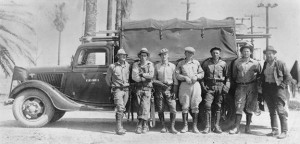
L. L. Mitchell, third from left, on a line crew in Modesto, Calif. in the late 1930s. IBEW 1245 Archive
Wrangling agreements with PG&E was one thing. Enforcing them was another, especially in the more remote areas of California. When L. L. Mitchell took a lineman’s job in Humboldt in the early 1940s, there weren’t many linemen there—and not much union. He volunteered to be an IBEW steward.
During the summers, line crews working on high lines used mule trains to pack in everything they needed, including equipment for raising poles. Out in the middle of nowhere, the crews worked seven days a week, straight through the summer. No weekends, no holidays, no overtime pay—just some compensatory time off when they got back to town.
One day Mitchell’s crew was getting ready to work on a line in the mountains west of Redding. It began to rain.
“Everybody jumped out of the truck and started getting tools and stuff. You had to walk in there because that was across rough country. You couldn’t get within a mile or so of the pole line, so you’d have to pack all your stuff in on your back and do your work. I just refused to get out from under the canvas,” Mitchell said.
The foreman threatened to fire him, but when Mitchell wouldn’t budge, the rest of the crew climbed back into the truck to get out of the rain. It was a small demonstration of what solidarity could accomplish.
The linemen had an IBEW contract but there wasn’t a lot in it. The best protection under the circumstances was to have a steward willing to argue for common sense.